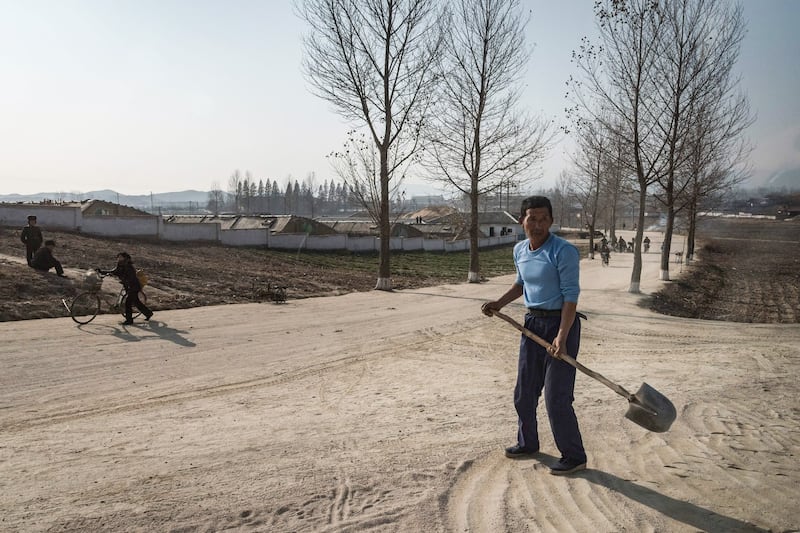North Korean authorities are forcing citizens to donate materials and labor to fix potholes and cracks in paved roads, but the people complain that it is unfair to make them sacrifice for maintenance on roads that they will never use, residents told Radio Free Asia.
Private cars are generally not allowed in North Korea, so most rural citizens get around on bicycles, which are not allowed on city streets. Only the wealthy elites will ever drive or ride in cars, so most citizens will never see the benefit of their labor.
Road maintenance was put on hold during the pandemic due to a lack of imported materials, but now government officials are enthusiastic about starting it up again, a resident of the northeastern province of North Hamgyong told RFA Korean on condition of anonymity for security reasons.
“Asphalt road repairs have not been carried out in Kyongsong County over the past few years due to the inability to import pitch for road repairs due to the coronavirus outbreak,” the resident said. “The asphalt in Kyongsong County is only a few kilometers long, and only the main section downtown is paved.”
He explained that the road in Kyongsong has many potholes and missing sections, making it more difficult to traverse in a car than if it were unpaved.
“It’s a mess, but local residents don’t really care,” he said. “It’s only the high-ranking officials who drive on that road every day who get annoyed jostling about inside their cars.”
Donations required
Road maintenance used to be the responsibility of the government, but now the citizens are made to donate materials and carry out repairs, a resident of South Hamgyong province told RFA on condition of anonymity to speak freely.
“Last week, they carried out asphalt road repair work in Tanchon for the first time in several years,” he said. “Residents of each neighborhood had to donate three buckets of gravel. … Orders were [also] given to donate things such as old car and bicycle tires.”
A lot of fuel, such as coal and firewood, is needed to make an asphalt mixture by melting pitch and mixing in gravel. And this fuel is hard to supply, the resident said.

“The pitch needed for asphalt road repairs must be purchased with foreign currency earned by each city and county,” he said. “The border [with China and Russia] have been closed due to the coronavirus, but supplies began to flow in from China little by little as the borders have reopened.”
With the reopening, local officials began outbidding each other for pitch, so that they could repair the roads in the areas they were responsible for, the second resident said.
"Pitch is not very helpful to the residents in their charge, but we are used to being made to repair the roads for their convenience."
Unpaved roads
Most of North Korea’s roads are unpaved, especially outside of major cities. Most are gravel or dirt.
According to the latest statistics from the CIA World Factbook on North Korea, in 2006, the country had 25,554 kilometers (15,878 miles) of road, 724 kilometers (450 miles), or roughly 2.8% of which was paved.
However, the current percentage is likely higher; at the start of Kim Jong Un's reign in 2011, each municipality was encouraged to compete with each other in terms of how well they embodied the country's founding juche ideology of self-reliance.
Each county, city, and province is judged on how strong and vibrant their economies were, how happy and prosperous their citizens are, and how beautiful and modern their infrastructure is.
A huge part of beautification included paving major roadways that go through towns and cities, even if only for a few kilometers (miles) in each direction.
Rolling out the black carpet
Though most roads in the capital Pyongyang are paved, few are as one gets farther from the city center. Most other cities have a much smaller percentage of paved roads, and the tiny hamlets in the countryside are mostly unpaved.
Local government officials seek to pave the roads not only for their own convenience, they want to impress inspectors from the central government who come by each year, the North Hamgyong resident said.
“Every fall, inspectors from the Central Committee travel around the country to evaluate the status of land management projects,” he said. “Road management is a major evaluation item, so the local officials show more interest in road repairs than residents’ lives for their own sakes.”
Translated by Claire Shinyoung Oh Lee. Edited by Eugene Whong.
